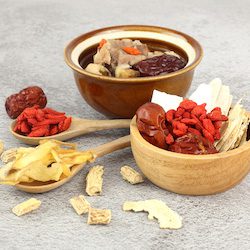 Arthritis is a painful and often debilitating joint inflammation that affects millions of Americans. Osteoarthritis or degenerative joint disease is the most common form of arthritis and occurs primarily in older individuals. Rheumatoid arthritis is an autoimmune condition that can affect individuals of any age.
Arthritis is a painful and often debilitating joint inflammation that affects millions of Americans. Osteoarthritis or degenerative joint disease is the most common form of arthritis and occurs primarily in older individuals. Rheumatoid arthritis is an autoimmune condition that can affect individuals of any age.
Traditional Chinese Medicine (TCM) has a number of different strategies for healing arthritic conditions. Acupuncture is one of the most common and effective treatments. Acupuncture can reduce inflammation and strengthen the joint. Unlike the most common arthritis medications, acupuncture rarely has side effects aside from feelings of deep relaxation, tranquility and, in some cases, euphoria.
TCM also relies upon food therapy as a means of treating arthritis. Food therapy is based upon an understanding that different types of foods have different energetic properties that can be a tremendous aid (or a hindrance) to the healing process. Beneficial foods can reduce inflammation and nourish the joint tissue. Harmful foods can contribute to arthritis and dem-mineralize the joints.
In food therapy, the dietary treatment should be individualized; what is good for one individual may not be good for another. Everyone has a unique energetic makeup; therefore, the diet that is most suitable to his or her condition will also be unique. One should consult with a qualified practitioner to make sure the proper foods are selected.
Having said that, here are some general suggestions for individuals with arthritis. These suggestions are based upon Traditional Chinese Medicine (TCM) as well as the latest scientific research:
- Get plenty of rest. In TCM it is said that the blood and energy of the body are replenished during sleep. Chronic insufficient sleep can cause the body to tap into its storehouses of energy in the bones and sinews, thereby weakening these structures. “Sufficient sleep” is indicated by feeling rested in the morning.
- Eat good fats. Omega-3 fats in particular help to reduce inflammation and may have a beneficial effect on the joints. The best sources are krill oil, fish oil, or flax oil.
A word on supplements: Quality is very important. Low-quality supplements are often less effective. Speak to your healthcare practitioner to determine which supplements are best for you.
 Eat plenty of fresh organic and/or locally grown vegetables. Yellow, green, and orange are most beneficial.
Eat plenty of fresh organic and/or locally grown vegetables. Yellow, green, and orange are most beneficial.- Avoid the nightshade family of vegetables (particularly tomatoes, but also eggplant and potatoes). These vegetables contain the calcium inhibitor solanine and can worsen arthritic conditions.
- Limit meat intake to 4 oz. or less per serving. Too much protein at a meal may be inflammatory and deplete the bones of calcium and other nutrients. Chicken and beef bone broth (made fresh from chemical free, pastured or organically raised animals only) can be an excellent tonic for the bones and joints.
- Avoid or minimize typical arthritis triggers such as coffee, soda and other caffeinated beverages; dairy products (including low fat or skim milk), alcohol, excess salt, refined sugar, and refined grain/flour. These substances all may leach calcium and other minerals out of the body and worsen inflammation.
- Soak and sprout all whole grains and legumes for 8-12 hours. Doing so neutralizes potentially harmful phytic acid (a substance in the bran) and other substances that can interfere with nutrient absorption.
- Consider supplementing with Vitamin D. Research has shown that individuals sufferingfrom arthritis tend to have suboptimal Vitamin D levels. Subsequent Vitamin D supplementation was shown to reduce pain levels. Cod liver oil is one of the best food-based sources of Vitamin D (don’t worry—it usually comes flavored these days). If you take an additional nutritional supplement make sure it is Vitamin D3 (not D2, which is less therapeutic).

Also keep in mind that in TCM, arthritis is typically classified into cold, hot, and damp conditions. Here are some tips that focus on each of these situations:
- If you suffer from arthritis that is worse in the cold and is improved by heat, then a tea made from fresh or dried ginger and cinnamon may be helpful. You can also rub ginger and garlic directly on the affected area. Beneficial foods include walnuts, scallions, mustard greens, black beans and parsnips.
- If your arthritis tends to feel worse with heat and better with cold, avoid all spicy foods, alcohol and coffee. Eat plenty of fresh fruits and vegetables. Cabbage, celery and mung beans may be particularly helpful.
- If your arthritis tends to feel worse with damp weather, definitely avoid dairy and refined sugars and grains. Celery, mung beans, adzuki beans, red beans and mustard greens can be helpful.
 Eat plenty of fresh organic and/or locally grown vegetables. Yellow, green, and orange are most beneficial.
Eat plenty of fresh organic and/or locally grown vegetables. Yellow, green, and orange are most beneficial.


